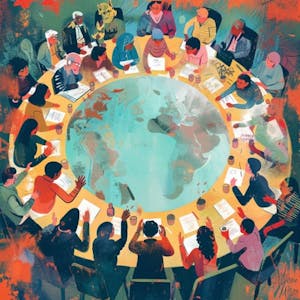Making Democracy Fit for Climate
About this Course
Climate change has been high on the political agenda for years, yet greenhouse gas emissions continue to rise. Globally, communities are already experiencing the consequences of the crisis in various ways: from increases in extreme weather and changes to ecosystems to rising sea levels and depleting natural resources. Despite the clear consequences of climate change, political action has so far proven inadequate at addressing the crisis. Democratic countries are no exception in this regard, which raises questions about the democratic system\'s ability to deliver the policies and actions needed to address climate change. The goal of this course is to zoom in on the relationship between democracy and climate change action. Do democratic systems have the capacity to deal with a threat like the climate crisis? If so, what will this require in terms of innovating democracy as a political system? During the course, you will meet researchers and experts from the University of Copenhagen who specialise in various areas relevant to this course. This includes scholars working on political and democratic theory, climate and environmental science, authoritarianism, international politics, and non-state actors. Furthermore, you will be presented with interviews from real-world actors who have engaged in the climate debate in various ways. We hope you will join this course to equip yourself with the knowledge needed to take part in the ongoing discussions related to climate change and the role of democracies in addressing its many challenges.Created by: University of Copenhagen

Related Online Courses
In this course, learners will elevate their UX design skills by immersing themselves in high-fidelity design and user testing using Figma, a powerful industry-standard tool. They will learn how to... more
The Foundations of Teaching for Learning programme is for anyone who is teaching, or who would like to teach, in any subject and any context - be it at school, at home or in the workplace. With... more
This course focuses on how to design and build secure systems with a human-centric focus. We will look at basic principles of human-computer interaction, and apply these insights to the design of... more
How might what we love - what we watch, what we read, what we post - make our communities healthier and more vibrant? This question guides Fandom and Popular Culture in the Digital Age. In our... more
Questo corso ti insegna come creare un modello per le didascalie delle immagini utilizzando il deep learning. Scoprirai i diversi componenti di un modello per le didascalie delle immagini, come... more








